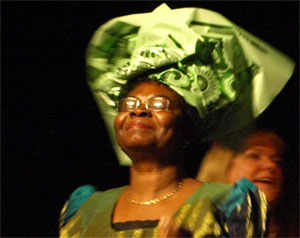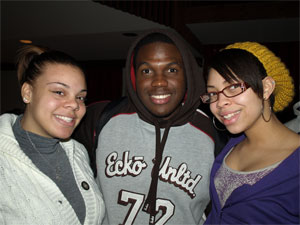 |
On Monday, the Black Student Advising Centre hosted a dialogue -- "From Dr. Martin Luther King Jr.'s Dream to President Elect Barack Obama's Message of Hope." (Annie Burns-Pieper Photos) |
“I have a dream that one day this nation will rise up and live out the true meaning of its creed: 'We hold these truths to be self-evident, that all men are created equal.'
I have a dream that one day on the red hills of Georgia, the sons of former slaves and the sons of former slave owners will be able to sit down together at the table of brotherhood.
I have a dream that one day even the state of Mississippi, a state sweltering with the heat of injustice, sweltering with the heat of oppression, will be transformed into an oasis of freedom and justice.
I have a dream that my four little children will one day live in a nation where they will not be judged by the color of their skin but by the content of their character.
I have a dream today!”
These words continue to resonate no matter how many times you hear them, 45 years after they were spoken for the first time. They were amplified to chilling effect through the McInnes Room on Monday, Jan. 19 before the beginning of the event entitled "From Dr. Martin Luther King Jr.’s Dream to President Elect Barack Obama’s Message of Hope," a dialogue hosted by the Black Student Advising Centre.
While the Obama hype may be starting to feel like too much to many after Tuesday’s inauguration, in the context of Dr. Martin Luther King Jr.’s Dream, the civil rights movement and the problems that continue to plague communities of African descent all over North America and the world, his inauguration can be seen as nothing less than momentous.
At Monday’s event, held on Dr. Martin Luther King Jr. Day, youth and senior leaders in the black community were invited to partake in a forum. Audience members could engage in a dialogue with the panel on what Obama’s presidency means for the black community, what current challenges are, and where the community is going.
The consensus reached was “We have come far but we have a long way to travel,” in the words of Shawna Hoyte, a lawyer and social worker living in Nova Scotia.
“Racism is subtle, it’s covert but as a black student and a black person you feel it,” added Neena Watson, a second-year master’s student and the vice-president of the Black United Students Association at ±«Óătv.
McCollins Jones, president of the ±«Óătv African Students Association emphasized the need to “convert negativity to positive energy” and to not let racism spurn more hate and negative action. “Anger can cripple you,” said a nursing student who talked about feeling isolated in her program of study.
“We need to raise our children with values and to be strong of mind so each generation can move further ahead,” said aspiring doctor Janissa Browne, president of ±«Óătv Caribbean Connection, as she considered out loud how to end the cycle of racism.
As the popular quote goes: “Rosa sat so Martin could walk; Martin walked so Obama could run; Obama is running so our children can fly!”
Despite the issues laid out in this forum like racism, inequality and stereotypes which still require hard work, President Obama has clearly given a beacon of hope to all of us, no matter our skin color. He has taught us that “yes we can” move beyond the cycle of racism which makes us all inhuman.
SEE VIDEO:

